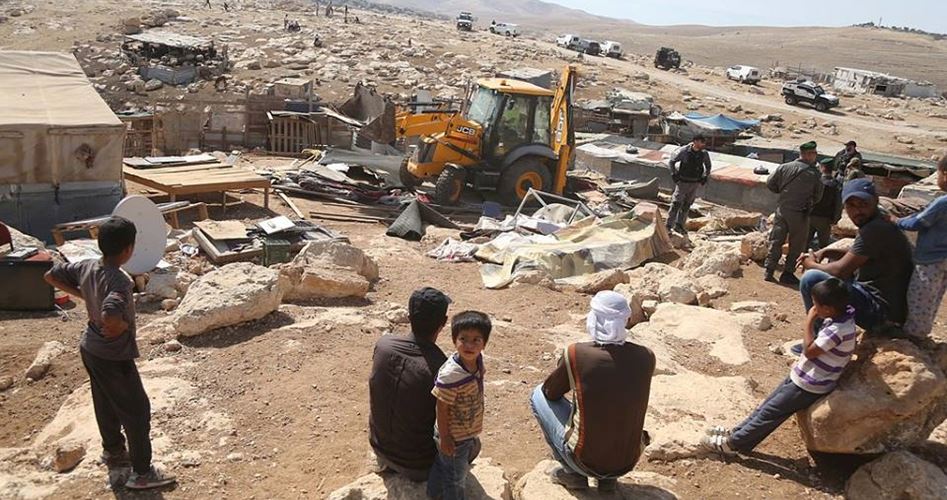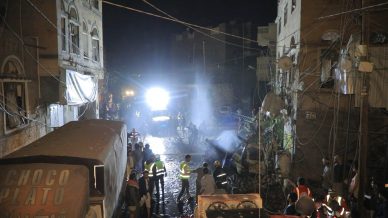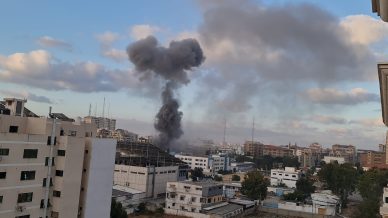Israeli B’Tselem Human Rights Center said on Wednesday that Israel’s demolition of Palestinian Bedouin communities represent “war crimes”.
“On Thursday 24 May 2018 three Israeli Supreme Court justices – Noam Sohlberg Anat Baron and Yael Willner – ruled that the state may demolish the homes of the Palestinian community of Khan al-Ahmar transfer the residents from their homes and relocate them” read a statement by B’Tselem. “Such actions which would spell ruin for the residents’ lives constitute a war crime for which all those involved in its execution will bear personal liability.”
The residents of Khan al-Ahmar belong to the Bedouin Jahalin tribe. In the 1950s they were driven out of the area of Tel Arad in the Negev (within Israel) and made their new home in the West Bank at a site where the settlement of Kfar Adumim was later established the statement added.
B’Tselem said the residents were driven out again and took up residence at their current location some two kilometers south of the settlement. The community consists of 32 families that make up a total of 173 residents 92 of them minors. In addition to homes the community has a mosque and a school that serves more than 150 children between the ages of six and fifteen about half of them from neighboring Palestinian communities.
B’Tselem further stated: “For years Israel has been endeavoring to displace this community for a variety of reasons including the expansion of nearby settlements de facto annexation of the area – without its Palestinian residents – and bisecting the West Bank cutting it in two. To that end Israeli authorities have made the lives of the residents intolerable hoping to make them leave their homes ostensibly of their own volition: the authorities refuse to hook them up to running water electricity or a sewage system refuse to pave roads for them prevent construction of homes or structures for public use in the community and have restricted their pastureland.
This policy forces the residents to live in unbearable conditions suffering a severe dearth of services in health education and welfare.
Khan al-Ahmar residents filed several petitions to Israel’s High Court of Justice against their being transferred. At the same time Israelis from settlements in the area also filed petitions seeking that the authorities implement the demolition orders. All the petitions were denied after the state assured the court that it is seeking alternate solutions for the community. In the latest petition the state wrote that such a solution had been found and that it plans to transfer the residents of Khan al-Ahmar to West Jahalin near Abu Dis. Although the residents objected to this plan last week (on Thursday 24 May 2018) the justices rejected their arguments and ruled that the state is allowed to transfer them.
According to B’Tselem this judicial formalism only thinly veils the heart of the matter: the fact that Israel intends to commit a war crime.
The structures in the community were indeed built without the residents having been issued building permits from the Israeli authorities. However the residents did not choose to do so because they are deliberate lawbreakers but because Israel’s policy keeps them from even being able to apply for building permits.
Far from acting in good faith the Israeli authorities have made cynical violent use of formalistic manipulations. If the community has no way to build legally what meaning can there be to ruling that their construction is illegal? B’Tselem maintained.
Another plan to transfer the residents to West Jahalin was made over the heads of the residents without consulting them at all. This is par for the course in the West Bank where Palestinian residents have no say in the various planning committees employed by the state to serve its own interests said B’Tselem.
The proposed plan not only forces the residents to leave their homes but compels a drastic change in their way of life. Contrary to what Justice Sohlberg wrote it does not enable the residents to continue working as shepherds.
The land from which the justices ruled that the residents be transferred is an occupied territory. IHL provisions bind Israel in all its actions in the Occupied Territories.
Unlike many other violations carried out by Israel in the territories it occupied in this case neither the state nor the court troubled themselves to offer explanations for the breach of these provisions. They addressed the matter as though it were merely a minor technical issue of “illegal construction”.
Again reality shows otherwise: This is not a trivial or insignificant violation of IHL but a breach that constitutes a war crime.
The provisions of IHL prohibit the forcible transfer of protected civilians unless the security of the population or imperative military reasons so demand. Obviously these exceptions are irrelevant when the state seeks to take over land for the purpose of future expansion of settlements in the area or for any such similar purpose. The prohibition on forcible transfer applies not only to the use of physical force but also to compelling people to leave their homes against their will or as a result of pressure exerted upon them or upon their families. Forcible transfer is a war crime and all those involved in authorizing and executing it bear personal liability for its commission.
Transferring the community of Khan al-Ahmar is part of Israel’s longstanding policy in the Occupied Territories. As a rule Israel treats most of the West Bank as though it is meant to serve Israeli interests only and goes to considerable lengths to minimize the presence of Palestinians there.
Over the years the Supreme Court has sanctioned almost every violation of Palestinians’ rights brought before it: demolition of homes administrative detention torture restrictions on freedom of movement and denial of the right to compensation for injury caused by Israeli security forces. This ruling is but the latest addition to this list this time paving the state’s way to committing a war crime. Personal liability for the commission of this crime will be not only that of policy-makers but also of those who paved the juridical route enabling it.















